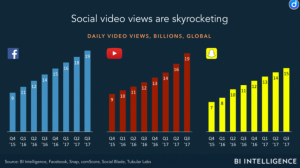The adoption of marketing automation technology has been rapidly on the rise. MarketsandMarkets forecasts the Global Marketing Automation Software market to grow to $ 5.5 billion in 2019, from $ 3.65 billion in 2014. While automation can help with scalability of many marketing operations, can it ever supplement creative content?
I use a lot of digital tools, but I think it’s fair to say that as a writer, Microsoft Word is my favourite child. With spellcheck alone it’s made a strong, squiggly red mark on my life. But it’s going too far – it’s trying to second-guess me creatively. This I cannot abide.
I’m not sure how long this has been going on for. I’ve only just noticed that Word these days seems to use a blue squiggly line to point out where it thinks you’re being superfluous with your language. Which is fine, in its essence, and hideously frustrating in its execution.
Case in point: I wrote the other day that I ‘really enjoyed’ something. Word took issue with this and made no bones about telling me it wanted to change ‘really enjoyed’ to just ‘enjoyed’. In so doing of course it ignores any overt expression, personality or, indeed, context. The thing wasn’t just an enjoyable thing; it was really enjoyable. It was so much more enjoyable than that other enjoyable thing I did that I felt compelled enough to express a heightened level of enjoyment.
I maintain there’s still nothing quite like the human touch
Which brings me to my point (much as I’d love to keep going with the ‘things that annoy me about Word’ routine). What we’re talking about here is artificial intelligence – AI. More specifically, I want to talk about why the machines cannot suppress or supplant our creativity. At a time when personalisation and the user journey mean so much to content creators and the brands that employ them, I maintain there’s still nothing quite like the human touch.
The threat of automation
AI is very much in the news; where once the robots took over manufacturing jobs, now it’s the turn of white collar workers to feel the threat of automation.
Earlier this month, for example, Fukoku Mutual Life Insurance in Japan announced it was making 34 employees redundant and replacing them with IBM’s Watson Explorer AI, a cognitive technology they say “can think like a human”, enabling it to “analyse and interpret all of your data, including unstructured text, images, audio and video”.
Research by Forrester meanwhile suggests AI will destroy 6% of all jobs in the US by 2021, and the generally accepted view is that many workers will feel the crunch long before other jobs they could feasibly do start to pop up elsewhere.
Cognitive technology they say “can think like a human”
“Without proper governance and re-skilling of workers, technology will eliminate jobs faster than it creates them,” says Cecilia Reyes, chief risk officer of the Zurich Insurance Group. Her comments were made in light of the recent World Economic Forum (WEF) Global Risks Report 2017, which made no bones about the fact that AI has the greatest potential benefits to technological advancement, but also the greatest potential negative effects and the greatest need for better governance.
Admittedly I’m digressing into slightly macroeconomic (perhaps apocalyptic) territory here, but this all applies to marketers as much as it does insurers. And it does show us that marketers’ core roles are likely to shift.
Automation in marketing
The time and cost benefits of automation when it comes to, say, big data analysis or social media management seem clear. These will only continue to improve in line with the increased sophistication of technology. But that also means you’ll need some kind of marketing overseer to ensure that these tools are working properly.
Marketers’ core roles are likely to shift
Chatbots, for example, on banking websites, are something I’ve had recent dalliances with. Robot assistants in hotels are now a thing, like Japan’s Henn-na Hotel, in Huis Ten Bosch, which has a robotic, velociraptor concierge. The benefits of these are marked by the personalisation of the customer experience. That is to say, the experience is entirely impersonal and that’s exactly what the customer likes about it. They’re not human, and as such customers don’t have to worry about being unconsciously judged while discussing their bank balance.
It’s appealing to those who want to feel guided, but not intruded upon. Which, strangely, has always been the distinctive mark of content marketing versus advertising.
With that in mind, it is still the creative content marketer that writes these bots their personality. I know from experience that giving a chatbot a warm and friendly feel is one thing, but then that personality needs to reflect how the person using it feels at any one time. There’s point in being all “Hey, how you doin’ baby?” when the person is at a stage in the conversation where they’re discussing how to pay back a whole heap of debt. You need a more conservative tone. But on the other hand if they’re checking into a hotel, some bells and whistles are a charming thing even if you’re fully aware they’ve been programmed in.
It is still the creative content marketer that writes these bots their personality
Human engineering
And this is the thing. In striving for better, quicker, cheaper processes, getting those tiny nuances right is solely a human feat of engineering. Automation to the creative is like a blue squiggly line – the automaton technically has a point, but it doesn’t leave any leeway for any kind of nuanced expression or personality. In the case of a customer service bot, you also need a human to create a humanised response in the first place.
The marketing world appears to assign more importance to content marketing than it does to marketing automation, if recent Smart Insights research is any indicator. That content marketing is considered one of the most important techniques at a marketer’s disposal (something I discussed in a previous blog), and markedly more so than automation, suggests that the marketing community sees a value in quality content creation that is unrivalled and very difficult to replicate.
Scale up
In terms of business scalability, some degree of automation will be fortuitous and necessary. It gives the content strategist the time to focus on those creations and interactions that can drive more human engagement and, therefore, ROI.
Efficiency is one thing, but the ability to craft creative business stories that truly stand out in their own right means that you’re being efficient in the right direction, and that your storytelling is still targeted at your audience.
It gives the content strategist the time to focus on those creations and interactions that can drive more human engagement
I would urge brands to think carefully about how they implement AI and content strategy. Where AI and marketing automation’s limitations lie is where bold creative thinking takes over and stands out. In a world that is increasingly guided by automatons, there’s even more onus to invest in artists; we could do some really enjoyable stuff together. There’s that squiggly blue line again.
Business & Finance Articles on Business 2 Community
(26)
Report Post




